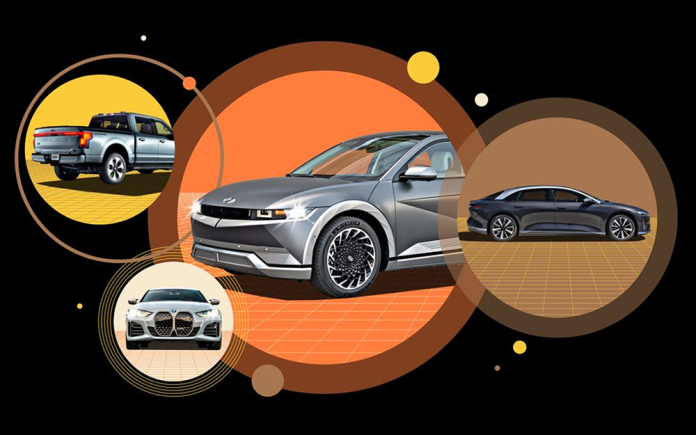
Are you ready to own an electric vehicle?
BY DENNIS SHELLY
The electric vehicle (EV) industry has been growing significantly for years, with tech giant Tesla grabbing much of the headlines and the Nissan Leaf a mainstay. However, most other significant automakers have also already committed to building more electric vehicles for a market that will eventually be entirely electric. Under a groundbreaking new state regulation, 35% of new 2026 car models sold in California must be zero-emissions, ramping up to 100% by 2035.
Every major automobile manufacturer is competing for its own market share with electric vehicles (EVs), and the majority is moving away from producing conventional gas-powered vehicles this decade. By 2025, General Motors has committed to building 30 new worldwide EVs, Jaguar has committed to building only electric vehicles by 2025, and Ford has committed to doing the same by 2030. By 2025, Volvo wants to have half of its vehicles be hybrids and the other half be battery-powered EVs. Additionally, they want to be totally carbon-neutral by 2040.
Clearly, electric vehicles (EVs) are the future of transportation, and they’re coming to a driveway near you.
Buying an electric vehicle.
Research the vehicle
Looking for an electric vehicle (EV) or a plug-in hybrid differs slightly from looking for a conventional gas-powered automobile. As with buying any automobile, the first step in shopping for a plug-in vehicle is to have a clear idea of what you want, or at the least, have a short list of potential purchases.
Also, you should consider an EV that qualifies for additional manufacturer rebates and tax credits.
Cost of EVs
Electric vehicles are often more expensive to purchase than their gasoline-powered counterparts. However, these prices continue dropping, Tesla has cut its prices on some of its models to compete against other electric vehicle manufacturers. Current starting prices of EVs can range between $30,000 to $40,000, however, certain provinces/states and the IRS provide incentives, rebates, and credits that might make them even more affordable.
Additionally, the IRS is giving tax credits of up to $7,500 for clean vehicles purchased in 2023 and beyond.
Available Models and Types
Electric cars come in a variety of forms and sizes, ranging from little hatchbacks to luxurious SUVs. Some are electric variants of well-known models. EVs are increasingly modern cars designed to run only on electricity.
Technically, there are two types of plug-in models: battery electric vehicles (BEVs), which operate entirely on electricity, and plug-in hybrid electric vehicles (PHEVs), which may run on electricity for a limited distance before converting to gas/electric hybrid mode.
Range of EVs
The typical range is 120 to 300 miles on a single charge, depending on road conditions and driving habits. That is plenty for most people who travel fewer than 40 miles each day. The new infrastructure bill aim to provide nearly $5 billion over five years to help states create a network of EV charging stations. Depending on the type of charging station you find, charging your automobile might take anything from 10 minutes…to 8 hours!
Why Should You Buy an Electric Vehicle?
When compared to regular gas-powered vehicles, electric vehicles have a lot lesser fuel expenses. A gallon of gasoline costs almost twice as much as the similar cost of running an electric automobile. This is particularly true if drivers choose off-peak power tariffs when charging at home. Electric rates are also more steady than oil prices.
- Electric vehicles have the lowest maintenance, repair, and tire costs and fuel savings.
- Because they have fewer and simpler components and don’t require fluid changes or tune-ups, most EVs offer cheaper repairs.
- Although it might take some time to recoup the cost of installing solar panels, “fuel” expenditures could be fully eliminated when paired with a residential solar system.
- EVs don’t emit any of the smog-emitting tailpipe emissions that are a major cause of asthma and other air pollution-related diseases and global warming gasses.
- Due to the absence of engine noise, EVs are quiet.
- Home charging is practical; some vehicles can even power your house when the power goes out.
To Conclude
There are currently more than ever newly manufactured electric vehicles on the road. Some nations and automakers have already announced plans to phase out the sale of gasoline and diesel vehicles in the very near future. It is up to you to determine if the benefits exceed the drawbacks of owning an EV. Early electric vehicles had gasoline engines removed and electric motors installed in order to meet California’s strict clean-air standards. Only a few of these “compliance cars” were made without much in the way of innovative technology or marketing to draw in customers. As global manufacturers scale up production supported by more than half a trillion dollars in new investment, new electric vehicles will provide higher performance and promise to be less expensive than conventional gas-powered automobiles. So, despite their limitations, electric vehicles can be a cost-effective, environment-friendly means of transportation and an increasingly plausible answer to the world’s pollution problems.
Hopefully, this article helps you with your decision-making process when making your next vehicle purchase!
Have a suggestion for our next article? Please contact us by visiting our website at www.eggheadit.com, by calling (760) 205-0105, or by emailing us at tech@eggheadit.com with your questions or suggestions.
IT | Networks | Security | Voice | Data










































